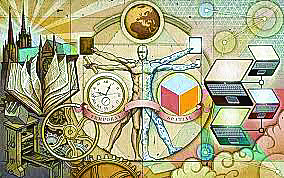Objectivity (vastu nistha in Sanskrit) entails a lack of bias in one’s thinking. It is being impartial and neutral in one’s disposition. Objectivity is the basis of scientific thinking. Objectivity is required for all scientific inquiries. Without being objective no insights into any problem can occur. José Bastos Padilha Neto (1967-present), a contemporary Brazilian film director, producer, and screenwriter has said, “Science is based on the possibility of objectivity, on the possibility of different people checking out for themselves the observations made by others. Without that possibility, there is no empirical principle capable of deciding between different arguments and theories.” Indeed experimentation, testing, and confirmability of any finding objectively and independently by different people helps in establishing the significance of that work. Objectivity is a very important attribute in life especially in the spiritual path or pursuit of truth.
The first step in developing objectivity is to accept the limitations of birth, old age, sickness, injuries, pain, pleasure, and all aspects associated with life and death. In the West people are so much engrossed in life that they seldom look at the reality of death. All efforts are made to prolong life, improve quality of life, aim at high-level wellness, and pursue other such pursuits. There are no models of old age in the West and people are generally seen seeking youthfulness. It can be said that generally, people in the West are biased toward life and living. So much so that at death it is called a “celebration of life.” On the other hand, in the East people are more concerned about death. Life after death is often the focus in the minds of many people. People in the East are biased toward death. Even young people are stoical in their perspective toward life. Both people who are biased toward living and people who are focused on death lack objectivity. Being objective entails cherishing life as long as one has it but a constant embracement of the reality of death with complete awareness all the time because it can come at any time. Such a perspective helps us remain grounded at the same time vigilant toward the pursuit of higher functions of our living that entail the search for the true meaning of human existence and the purpose of life that need to be accomplished before death.
Kabir (1440-1518), an Indian mystic poet and saint, whose sayings influenced India’s Bhakti movement in the 15th Century, says, “Kabira khada bazaar mein, sabki mange khair. Na kahu se dosti, na kahu se bair.” This means Kabir is standing in the marketplace wishing for welfare for all. He has neither any friendships nor any enmities with anyone at all.” This verse signifies the objectivity that is needed in our dealings. Kabir impartially led his life. He did not belong to any religion. He was a weaver but carried his business with fairness without being either friendly with his clients or developing any malice toward anyone. His life is an inspiration for those of us aspiring to develop objectivity in our disposition.
A barrier to objectivity comes from pain-inducing situations. Pain can come from our internal thought processes which can be handled somehow by altering our perception. However, sometimes it can also come from situations around us such as pollution, weather, and other environmental conditions. It can also emanate from events over which we do not seem to have control such as natural disasters like earthquakes, tornadoes, fire, etc., or manmade disasters like war, acts of terrorism, etc. How do we remain objective amid pain? It is very difficult to maintain objectivity under painful situations. Here, one must wait patiently for the pain to subside. No matter how severe the pain is, time always heals it. Either the human organism succumbs to pain in the form of death or the pain makes us stronger to endure greater pain. Pain should be considered as a source of strength.
Dr. Manoj Sharma is a Professor and Chair of the Department of Social and Behavioral Health at the University of Nevada, Las Vegas, USA. He is an avid practitioner of Kundalini Yoga.







